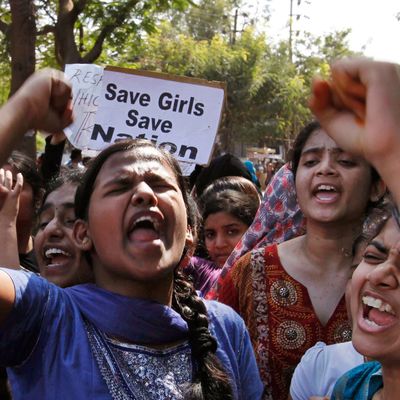
Several thousand women held a silent march to the Mohandas K. Gandhi memorial in New Delhi this morning, demanding justice for the 23-year-old victim of last month’s brutal gang rape who died from injuries to her intestines in a Singapore hospital over the weekend. There’s reason to believe the unnamed physiotherapy student — known as Damini, or lightning — might get some.
The six men arrested in the case are expected to be charged Thursday with kidnapping, rape, and murder, according to the AP, with prosecutors calling for the death penalty (with the exception of one of the accused, who may be underage). The case is also positioned to incite broader legal changes in India, where women say sexual harassment, known locally as “eve-teasing,” and rape are a daily threat. Worse, women are often blamed for their attacks (something Americans know a thing or two about), for daring to walk alone or not carrying chili powder to throw on their attackers, and shamed into marrying their rapists.
Now the government has set up a task force to monitor women’s safety in New Delhi, and two other groups have been formed to look into the handling of the rape case and suggest changes to national rape laws. India’s chief justice agreed to hear a petition to fast-track the thousands of rape cases lost in the country’s clogged legal system and suspend all lawmakers from the national and state legislatures who are facing prosecution for crimes against women. While we scratch our heads over the fact that legislators with abhorrent views on rape managed to get elected here in the U.S., six state lawmakers in India have outstanding rape charges, and two national parliamentarians face charges of crimes against women short of rape, according to the Association for Democratic Reforms. In the past five years, political parties across India nominated 260 candidates awaiting trial on charges of crimes against women, and parties ran six candidates facing similar charges for the national parliamentary elections.
Longtime New Delhi resident Sonia Faleiro summed it up nicely in today’s New York Times. “In retrospect it wasn’t the brutality of the attack on the young woman that made her tragedy unusual,” she wrote. “It was that an attack had, at last, elicited a response.”




